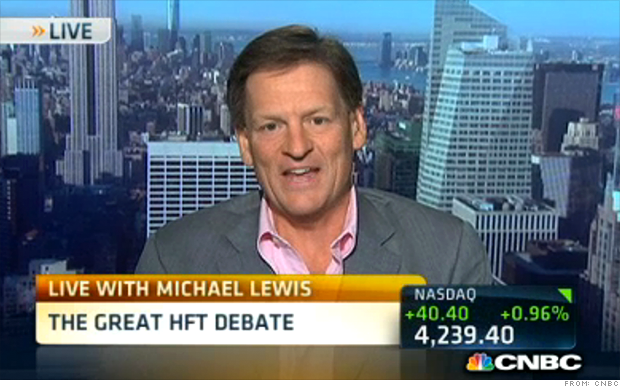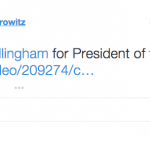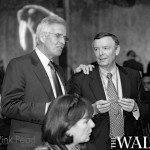How Michael Lewis scooped me
 By Christina Pellegrini
By Christina Pellegrini
I’ve read 180 pages of the new Michael Lewis book Flash Boys and like <a” href=”http://blogs.reuters.com/felix-salmon/2014/03/31/michael-lewiss-flawed-new-book/”>Reuters blogger Felix Salmon, I haven’t come across anything major that I didn’t already know about high-frequency trading and what it’s done to financial markets.
I’ve been interested in HFT for a few years. The first feature I wrote in journalism school was about how the Toronto Stock Exchange isn’t actually located on Bay Street but in what is marketed as a “top-secret” suburban data centre. I learned that the big brokers and these other firms I had not heard of before (the HFTs) were paying thousands in rent to house their computer servers next to those of the exchange in an attempt to shave teeny, tiny slices of a second off the speed of their trades. It’s called co-location and it’s a moneymaker for the exchanges. (I found the exact location of the data centre—address, building number, floor—through a Google search and visited the building last year. How top-secret could this place be?)
Here’s the thing: I didn’t get the story published. A portion of it appeared in a Financial Post Magazine photo essay last summer, but most of it has stayed stashed away in a folder somewhere on my MacBook. I’ve circled the technological evolution of financial markets for multiple class assignments. I’ve written about the death of open-outcry trading, the gestural language the traders once used when face-to-face trading was still a thing. Then there was that poorly made audio slideshow on the trading simulation competition that the University of Toronto’s Rotman School of Management hosts every year. And I even designed a pretty infographic on how electronic trading has taken over the Chicago Mercantile Exchange. And my thesis, which will be completed this summer, was supposed to be about HFT.
I’ve had a feeling something was rotten in financial markets for some time, but I spent more time talking about my suspicions than writing about them. And then this past Sunday night, I was watching 60 Minutes when <a ” href=”http://www.cbsnews.com/news/is-the-us-stock-market-rigged/”>Michael Lewis started talking. “The United States stock market, the most iconic market in global capitalism is rigged,” he said. “By whom?” asked 60 Minutes correspondent Steve Kroft. “By a combination of these stock exchanges, the big Wall Street banks and high-frequency traders,” Lewis responded. “Who are the victims?” “Everybody who has an investment in the stock market,” said Lewis.
Financial news has been in a state of WTF ever since Sunday’s segment. (You have to watch the main character of Flash Boys battle with one of the guys he says is rigging the market. It’s <a” href=”http://www.cnbc.com/id/101544772″>the best 23 minutes of CNBC all year.) Everybody and his mother is an expert in HFT now. And soon, every publication will write something on HFT faster than I can write my thesis and then no one will want to read anything more about it.
My reaction to all this: no freaking way.
I don’t know if markets are rigged. Most of the academic research I’ve read seems to dispute this. But what I do know is Lewis asked himself a lot of the same questions I did, but unlike me, he actually tried to find some answers and didn’t stop until he did. I’m not saying I could have authored Flash Boys. After all, Lewis has a way with words and narrative that few have. But I could have pursued the story further, asked more questions and kept asking them.
Earlier this week, I had lunch with a former editor and I told him the story about my first feature on co-location and my research on electronic trading and my thesis on HFT. He laughed at me for a good 30 seconds. Here’s why: Michael Lewis scooped me.
Remember to follow <a” href=”http://www.twitter.com/ryersonreview”>the Review and <a ” href=”https://twitter.com/rpobeirne/lists/rrj-2013-14″>its masthead on Twitter. Email the blog editor <a ” href=”mailto:ronan.obeirne@ryerson.ca”>here.












